Interkulturelle Wirtschaftskommunikation aus Sicht der Gesprächslinguistik: Interkulturalität in Gesprächen zwischen deutschen und französischen Geschäftspartner:innen
Main Article Content
Abstract
In many publications about intercultural business communication, misunderstandings in intercultural situations are explained with reference to culture, psychology, and mentality without taking specific linguistic aspects into consideration. Müller-Jacquier (2009: 27) calls this a fundamental attribution error and argues that conversational linguistics should be prioritized over explanations based on psychology and culturalization (cf. Müller-Jacquier 2019: 65). By analyzing the transcripts of conversations between French and German business partners in detail, it is possible to identify comprehension problems and analyze whether they are based on differing linguistic conventions. Furthermore, a priori attributions of people to cultures are avoided. From the perspective of conversational linguistics, a situation is considered intercultural only if culture and interculturality manifest themselves in the data. Intercultural competence and appropriate and successful behavior in specific contexts can also be determined by using this approach. Descriptive norms can be derived from the sequential analysis of conversations and the results may be used for training measures in companies. Apart from Helmolt's (1997) pioneering work, there are very few studies that examine oral Franco-German intercultural business communication from the perspective of conversational linguistics. Therefore, I aim at collecting further data within the framework of my dissertation project, and to derive recommendations for business practitioners.
Article Details

This work is licensed under a Creative Commons Attribution 4.0 International License.

